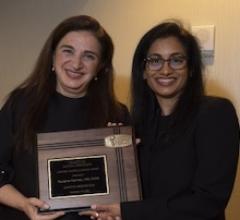
November 22, 2021 — Cardiologs, a leader in artificial intelligence (AI) cardiology diagnostics, announced the results of a clinical study that proved Cardiologs’ deep learning AI outperforms the Apple Watch ECG algorithm in the detection of atrial arrhythmias (AA), which are related to stroke risks. The data was accepted for a moderated digital poster presentation at the American Heart Association (AHA) Scientific Sessions 2021.
The study, which was conducted by a clinical team from the Institut Cardiovasculaire Paris-Sud (ICPS) in Paris, France, assessed the accuracy of AA detection using the original Apple Watch companion application (ECG 1.0 App) compared to Cardiologs' proprietary deep neural network (DNN). The team wanted to determine if the Apple ECG application was missing important atrial arrhythmias when monitoring patients remotely, and if so, could a more intelligent algorithm used in place of the foundational ECG 1.0 App reduce that risk and improve smartwatch ECG results. Findings demonstrated that the Cardiologs DNN increased sensitivity by 34% while maintaining specificity. In addition, Cardiologs reduced the number of unclassified readings from 25% to 1%, virtually eliminating the common challenge of inconclusive results from wearable smartwatch ECGs.
"We have found that having smartwatches, such as the Apple Watch, to monitor our patients for arrhythmias outside of our center is extremely valuable, and to find an algorithm that significantly improves the overall performance for detection of AA from wearable tech recordings is exciting for me, my colleagues and the patients we care for. Using a more intelligent algorithm will reduce the time spent by physicians reviewing inconclusive results, and also reduce the risk of missed, delayed, and incorrect diagnosis," said Dr. Laurent Fiorina, cardiac electrophysiologist at ICPS. "I look forward to exploring this opportunity to enhance smartwatch readings and supporting future studies of the Cardiologs DNN."
"Cardiac monitoring is almost a standard feature of modern wearables like the Apple Watch, but there are still opportunities to improve ECG analysis to get a more accurate diagnosis. It's exciting to see that our deep learning algorithm can provide a more precise reading, promising many benefits for both patients and healthcare professionals. This advance will no doubt clear the path for the next generation of wearable health technology," said Cardiologs CEO and Co-founder Yann Fleureau.
Cardiologs’ presentation, "An Artificial Intelligence-Based Smartwatch ECG Analysis Improves the Detection of Atrial Arrhythmia," will be available on-demand from Dec. 16–31, 2021.
About Cardiologs
Cardiologs is a medical technology company committed to transforming cardiac diagnostics using medical-grade artificial intelligence and cloud technology. Developed in partnership with leading physicians, the Cardiologs Holter Platform empowers clinicians worldwide to deliver expert cardiac care faster and more efficiently. CE-Marked and FDA cleared for detection of 14 cardiac arrhythmias, the Cardiologs Holter Platform is built on a growing database of more than 20 million ECG recordings and is supported by a number of clinical publications.
For more information: https://cardiologs.com/


 November 14, 2025
November 14, 2025 









